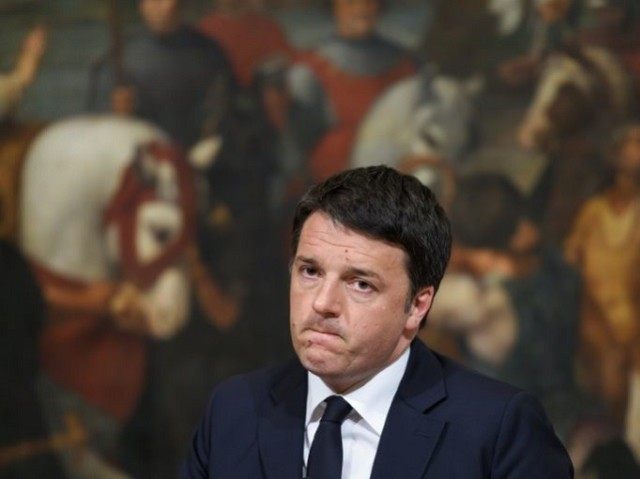The Brexit vote has put further stress on the beleaguered Italian banking system which may have to separate from the European Central Bank (ECB) and possibly the European Union (EU).
In the wake of market turmoil as a result of the landmark vote for Britain to leave the EU, Italian Prime Minister Matteo Renzi (pictured above) is confronted with a dilemma. Banks across Italy are facing increasing losses and challenges to stay afloat largely in part to them being tied to the actions and policies of the ECB.
Prime Minister Renzi now faces the choice of whether to stick with the EU and allow banks and businesses to fail, or ignore Brussels and act on his own, reports Die Welt.
The last time Italian banks were stress-tested in October 2014 the ECB found that in a serious crisis nine major Italian banks would go bust. According to Erik Nielsen, chief economist of Unicredit, the Italian government hasn’t done enough in the way of reform since the financial crisis of 2008. Mr. Nielsen said: “Italy has made the mistake of doing nothing, when all others have acted.”
Last year Italy was officially in a recession and the current market instability looks to destroy the small recovery the Italian market has enjoyed. Though Italy and Italian banks are not heavily invested in the UK, the banks are in such bad shape overall that the knock-on effect of instability could be substantial. The potential chain reaction of bankruptcies and bad loans threaten to bring the Italian banking system to its knees and cause the largest crisis of the Eurozone since 2008.
Some 18 per cent of all loans in Italy, €360 billion, are considered bad or non-performing. Half of the non-performing loans are from companies that are insolvent and cannot pay their debts. The result of this has been the prediction that only around 20 per cent of the debt owed will ever be paid back.
Banks in Italy must rely on public assistance, or bailouts, to counter the non-performing loans. According to EU rules the government may only bail out banks if private investors and creditors have already put up eight per cent of the costs themselves; this is to prevent tax payers’ money being used to prop up failing banks.
Prime Minister Renzi has been able to secure €150 billion from the EU, but it comes with the stipulation that it can only be loaned to healthy banks rather than insolvent ones.
The credit agency Fitch sees potential catastrophe for the EU if the Italian banking system fails. They claim that Mr. Renzi is in an impossible position due to the EU rules and does not foresee Brussels bending those rules to prevent a disaster.
In October Italy will hold a referendum regarding Senate reform, with many seeing the referendum as a test of the Italian people’s confidence in the leadership of Mr. Renzi.
Should the people vote against the policies of the prime minister, it could be seen as a drive toward a total rejection of the EU as part of a wider movement across Europe many are calling the Patriot Spring. Some see the election of the Five Star Movement (M5S) in Rome and Turin as evidence that the Italians are turning against the EU.
Giada Giani, an analyst at Citigroup, said: “The Italian constitutional referendum is, apart from the referendum on the United Kingdom’s membership of the European Union, the biggest political risk for Europe.”

COMMENTS
Please let us know if you're having issues with commenting.